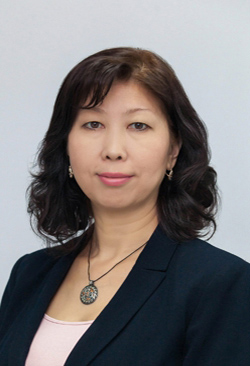April 2024
KAZAKHSTAN
EDITED BY

EUROPEAN PATENT ATTORNEYS ATTORNEYS AT LAW
TRADE MARK ATTORNEYS
Martin Luten The Hague, Munich E-mail: ipmanual@arnold-siedsma.com Website: www.arnold-siedsma.comIN COLLABORATION WITH
Alan Potter Australian Registered Patent Attorney E-mail: alanp@sortify.tm Saule Kulzhambekova Almaty, Kazakhstan E-mail: Skulzhambekova@BolotovIP.com Website: www.BolotovIP.com This chapter was last reviewed by the Author in December 2023.Kazakhstan is a republic in Central Asia, one of the fifteen Republics that prior to 25 December 1991, have formed the former Soviet Union (USSR). Kazakhstan declared its independence on 16 December 1991.
Kazakhstan belongs to the Republics that, at the end of 1991, formed the so-called Commonwealth of Independent States (CIS).
The Kazakh Patent Office, the National Institute for Intellectual Property of the Ministry of Justice, was established on 23 June 1992.PART 1 PATENTS
§1.01 Summary
Kinds of Patents
National patentDuration of Patents
20 years from the filing date for full national patents
Patentable / Not Patentable
An invention is patentable if it is new, involves an inventive step, and is industrially applicable.
The exceptions as mentioned in Rule 39 PCT apply.
Also not patentable are algorithms and computer software, projects and plans of layouts of construction, appearance of an article.
Novelty
Absolute novelty for patents applies.
6 months grace period preceding filing/priority date applies.
Filing Requirements and Application Procedure
Filing languages: any
Language of translation: Kazakh or Russian
Time limit for filing translation: 2 months from filing
A full national patent is granted after formal and substantive examination of the application
Specific Aspects of Regional Patents
Kazakhstan is a party to the Eurasian Patent Convention. Eurasian patents can be validated in Kazakhstan.
Specific Aspects of International Patent Applications (PCT)
Time limit for entering National/Regional Phase: 31 months from the priority date
Time limit for filing translation: 2 months from the national phase entry deadline date
(with possibility of further 2 months extension)Language of translation: Kazakh or Russian.
Governmental Websites
https://www.qazpatent.kz
§1.02 Detailed Information
Conventions and Legislation
Conventions
The relevant patent conventions of Kazakhstan are as follows:Paris Convention (International Union), 1883–1967, effective from 25 December 1991;
Convention Establishing the World Intellectual Property Organization (hereinafter ‘WIPO
Convention’), 1967, effective from 25 December 1991;
Patent Cooperation Treaty (PCT), 1970, effective from 25 December 1991;
Budapest Treaty on the International Recognition of the Deposit of Microorganisms for the Purposes of Patent Procedure (hereinafter ‘Budapest Union’), 1977, effective from 24 April 2002;
Hague Convention Abolishing Requirement for Legalization, 1961, effective from 30 January 2001;
Eurasian Patent Convention, 1994, effective from 4 November 1995; and
Patent Law Treaty, 2000, effective from 19 October 2011.
Laws
Patent Law No. 427-3IPK as of 16 July 1999, which entered into force on 21 August 1999 (the law governs patent protection of inventions, utility models and industrial designs).
Kinds of Patents
The kinds of patents are as follows:Full National Patents for invention.
Duration of Patents
-
Quick Answer: Duration 20 years from filing date
Patent term extension / Supplementary protection certificate
-
Quick Answer: Supplementary Protection Certificates (SPCs) or patent term extension for pharmaceuticals Yes, extension of patent terms for pharmaceuticals
The term of validity of a pharmaceutical and/or an agrochemical patent, the use of which requires obtaining a marketing authorization from a respective competent authority may be extended at a request of the patent owner by no more than five years.
Requirements for Renewal
| Quick Answer: Due date maintenance fees | Filing date |
| Quick Answer: Grace period for maintenance fees | Not applicable in this jurisdiction |
| Quick Answer: First due date for regular maintenance fees | 1 year from filing date |
Annuities are payable to maintain both national patents beginning from the first year of issuance. The due date for payment is calculated from the anniversary of the date of filing of the application.
The Kazakhstan law does not provide for payment of the maintenance fees/annuities during
the prosecution of the application.
Patent annuities are paid after grant.
The validity of the title of protection shall expire prematurely in the event of failure to pay the annual maintenance fee by the prescribed time limit as from the date of expiration of the said time limit. At the same time at the request of the patent owner the validity of the patent that has expired prematurely on the above mentioned ground may be yet restored, within three years following the date of expiration of the time limit for payment the annual maintenance fee, provided that the patent owner presents legitimate reasons to justify their failure and furnishes a document containing proof of payment of the prescribed restoration fee.
Patentable / Not Patentable
An invention is patentable if it is new, involves an inventive step, and is industrially applicable. Patents can be granted for devices, products (including chemical and pharmaceutical products), processes (including diagnostic and therapeutic methods for animals and humans),
known substances or strains used for a new indication. The exceptions as mentioned in Rule 39 PCT apply.The list of exceptions to patent protection includes the following:
scientific discoveries and theories, mathematical methods;
business methods;
symbols, schedules and rules, methods of mental operations;
algorithms and computer software;
projects and plans of layouts of constructions;
solutions regarding appearance of an article;
methods of cloning human beings and human’s clone;
methods of altering the genetic integrity of human germline cells;
the use of human embryos for commercial, military, and industrial purposes
Chemical compositions
Patents can be granted for chemical compositions that are patentable products or processes.
....continue reading

 Saule Kulzhambekova
Saule Kulzhambekova